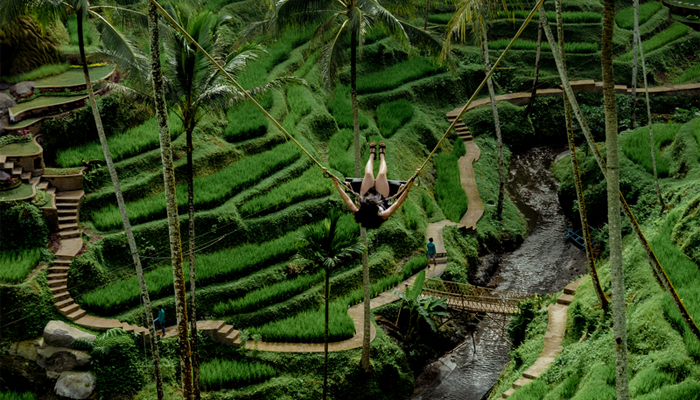Why Agrotourism in Ubud Is the Perfect Escape for Nature Lovers
Why Agrotourism in Ubud Is the Perfect Escape for Nature Lovers
Blog Article
Exploring the Rich Society and Awesome Landscapes of Agrotourism in Ubud
Ubud, usually celebrated as the heart of Bali, presents an unique opportunity for those seeking to experience agrotourism that seamlessly blends cultural richness with mind-blowing landscapes. As travelers browse via Ubud's dynamic tapestry of customs, they are welcomed to uncover the stories behind each cultural technique and landscape feature.
Discovering Ubud's Cultural Heritage
Nestled in the heart of Bali, Ubud acts as a vibrant epicenter for those eager to dive into the island's rich cultural heritage. Recognized for its imaginative practices, Ubud is a hub where old methods meet modern expressions, producing a special tapestry of cultural experiences. Visitors are drawn to its myriad of galleries, workshops, and temples, each supplying a glance into Bali's creative and historical legacy.
Central to Ubud's social appeal is the Ubud Palace, a significant spots that stands as a testament to the area's imperial heritage. The royal residence often holds conventional dance efficiencies, providing a genuine understanding into Balinese narration through dancing and music. The roads of Ubud are lined with galleries showcasing works of both prominent Balinese artists and arising skills, reflecting the island's dynamic art scene.

Immersive Agricultural Knowledge

In addition, Ubud's agrotourism efforts commonly include workshops on lasting farming methods. These workshops stress the importance of natural farming, permaculture, and biodiversity preservation, often under the guidance of knowledgeable specialists. They function as an academic platform for visitors, promoting a deeper admiration for the ins and outs of sustainable farming.
Furthermore, visitors can discover coffee and chocolate ranches, where they find out about the procedures of cultivation and manufacturing. Directed tours supply thorough explanations of each step, from bean to mug or chocolate sheathing to delicious chocolate bar, enhancing the total understanding of these considerable farming products.
These immersive experiences not just enrich site visitors' understanding of Ubud's agricultural heritage yet also advertise sustainable tourist practices, making certain the conservation of these social landscapes for future generations.
Beautiful Rice Terraces and Landscapes
Structure on the immersive agricultural experiences, site visitors are drawn to the exciting scenic rice terraces and landscapes that specify Ubud's countryside. The iconic Tegalalang Rice Terraces are especially renowned, supplying a splendid display of Balinese resourcefulness in farming. These terraces are not just useful however also act as a testimony to the unified connection between the Balinese individuals and their environment. The subak irrigation system, a UNESCO-recognized cultural heritage, showcases a sustainable and ancient method of water administration that remains to support regional farming.
As visitors pass through the winding paths with the terraces, they are consulted with scenic sights that stretch throughout green areas, stressed by guiding coconut hands and the distant silhouette of Mount Agung. The landscape offers a tranquil background that welcomes contemplation and admiration of nature's beauty (Agrotourism in Ubud). For those interested in digital photography, the ever-changing light and darkness cast by the daybreak or sunset provide countless opportunities for recording magnificent pictures
Beyond the terraces, Ubud's moving hillsides and rich vegetation produce a varied tapestry that beckons expedition. Treking trails meander via these landscapes, enabling visitors to get in touch with the land and experience the relaxing rhythm of rural life.
Farm-to-Table Culinary Delights
Amidst the all-natural charm of Ubud's landscapes, the farm-to-table movement supplies an authentic cooking experience that links visitors with the area's agricultural heritage. This strategy celebrates the cooperative connection in between the land and its fruit and vegetables, with local ranches offering fresh, natural active ingredients to Ubud's cutting-edge chefs. Site visitors are invited to take part in a gastronomic journey where the beginnings of each ingredient are transparently showcased.
In Ubud, farm-to-table eating transcends plain consumption; it comes to be an academic experience. Dining establishments usually use directed scenic tours of the farms providing their kitchens, enabling restaurants to witness sustainable farming methods firsthand. This link fosters a much deeper appreciation for the careful treatment that goes into growing the crops and increasing animals.
The culinary offerings show the abundant variety of Ubud's agricultural landscape, including recipes that highlight seasonal produce and standard Balinese tastes. From lively salads teeming with unique eco-friendlies to fragrant curries infused with fresh natural herbs, each plate is a testimony to the area's bountiful harvests.
Additionally, the farm-to-table principles supports regional farmers and communities, making certain that farming traditions are protected while promoting financial sustainability. This activity emphasizes a dedication to quality, sustainability, and the celebration of Ubud's distinct terroir.
Involving With Regional Craftsmens
Several site visitors find themselves captivated by the elaborate craftsmanship of Ubud's regional artisans, whose work shows the region's rich cultural heritage. These artisans, commonly masters of their craft, contribute considerably to Ubud's lively social landscape. From traditional batik textiles to carefully sculpted wood artifacts, each piece tells a story interwoven with generations of expertise and tradition.
Engaging with these artisans provides an unique opportunity to dive much deeper right into Balinese culture. Numerous workshops provide hands-on experiences, where travelers can learn techniques given via centuries. These interactive sessions not just foster recognition for the artisans' skills but additionally give a significant link to the region's background and traditions.
Visitors can check out craftsmen villages such as Mas, renowned for its great wood makings, or Celuk, well-known for exquisite silver jewelry. Below, one can witness the commitment and precision called for to produce each work of art. Investing in straight from these artisans makes certain that the earnings support regional areas and sustain conventional practices.
In Ubud, involving go now with local craftsmens is not simply a tourist task; it is an enriching social exchange that enhances the agrotourism experience, leaving site visitors with a much deeper understanding and gratitude of Bali's artistic heritage. - Agrotourism in Ubud
Final Thought
The exploration of Ubud's agrotourism uses a profound recognition for Balinese cultural heritage and all-natural grandeur. The combination of conventional dancing, hands-on farming, and awesome rice terraces develops a special tapestry of experiences that captivate site visitors. The check it out farm-to-table culinary offerings display the region's agricultural bounty, while interactions with neighborhood craftsmens provide understanding into Ubud's abundant artistic traditions. Jointly, these aspects foster a much deeper understanding and gratitude of Ubud's sustaining cultural and all-natural appeal.
Central to Ubud's cultural allure is the Ubud Palace, a considerable spots that stands as a testimony to the area's imperial heritage.Ubud offers a myriad of immersive agricultural experiences that allow visitors to engage deeply with the island's agrarian way of life.Structure on the immersive farming experiences, site visitors are attracted to useful reference the exciting scenic rice balconies and landscapes that define Ubud's countryside.In the middle of the natural elegance of Ubud's landscapes, the farm-to-table activity supplies a genuine culinary experience that links site visitors with the area's agricultural heritage.Lots of site visitors find themselves mesmerized by the complex workmanship of Ubud's local artisans, whose work reflects the region's rich social heritage.
Report this page